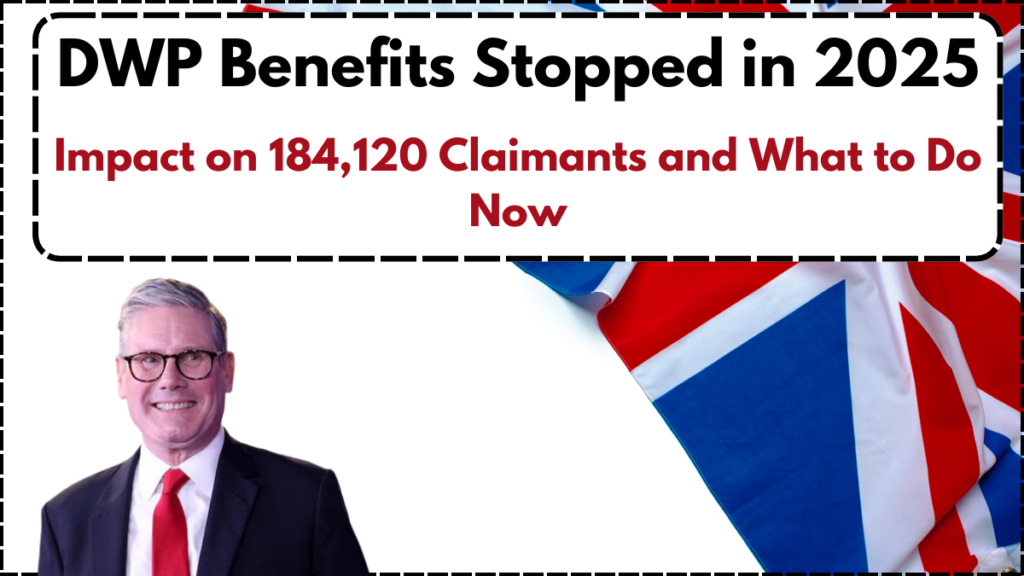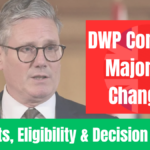As of April 2025, the Department for Work and Pensions (DWP) has halted benefits for over 184,000 individuals across the United Kingdom. This significant change stems from an ongoing reform initiative aimed at transitioning claimants from legacy benefits to the Universal Credit system. The impact has been immediate and widespread, leaving many without their expected financial support.
This article provides a comprehensive overview of the changes, offers guidance on how to reinstate your benefits, and highlights the essential actions to take if you are affected.

Why Have DWP Benefits Been Stopped?
The stoppage of benefits in 2025 is directly tied to the DWP’s strategic migration process. This initiative involves transferring individuals from multiple older benefit schemes into a unified system known as Universal Credit. The affected legacy benefits include:
- Working Tax Credit
- Child Tax Credit
- Income Support
- Housing Benefit
- Employment and Support Allowance (income-based)
- Jobseeker’s Allowance (income-based)
To facilitate this transition, the DWP issued over 800,000 formal migration notices between 2022 and early 2025. These notices provided a strict three-month deadline for claimants to register for Universal Credit. As of April 2025, individuals who did not comply have had their benefits officially terminated.
Key Facts and Data
| Category | Details |
|---|---|
| Affected Individuals | 184,120 people |
| Migration Deadline | April 2025 (3 months post-notice) |
| Primary Cause | Failure to switch to Universal Credit |
| Required Next Step | Create a Universal Credit account |
| Claim Processing Duration | Around 28 days |
| Essential Documents | ID, bank info, income proof, housing costs |
How to Know If You Are Affected
If your benefit payments have ceased unexpectedly or if you recall receiving a migration notice from DWP earlier in the year, you may be one of the individuals impacted. The letter required recipients to:
- Create a Universal Credit account within three months.
- Finalize their application within 28 days of account creation.
Failure to complete either step led to an automatic discontinuation of benefits. Reasons for non-compliance vary: overlooked letters, misunderstanding of the instructions, or technical difficulties with the application platform.
What to Do Immediately if Your Benefits Have Been Stopped
Act promptly. If you missed the deadline, you can still apply for Universal Credit, but the process will now be treated as a new claim. Here are the steps:
- Visit GOV.UK and initiate your Universal Credit application.
- Create a personal account (or two, if claiming jointly).
- Link joint accounts using the provided partner code.
- Gather and upload necessary documentation:
- Valid photo identification (passport or driving license)
- Recent payslips or earnings reports
- Rent or mortgage information
- Medical or disability documentation if applicable
- Active bank account details
- Monitor your application status and respond to any requests from DWP promptly.
Expect the review process to take approximately four weeks. Ensure your contact information is accurate to avoid missing vital communications.
Purpose Behind the Universal Credit Migration
The migration to Universal Credit aims to simplify the welfare system. By consolidating multiple supports into a single monthly payment, the government hopes to:
- Minimize administrative burdens
- Reduce delays and errors
- Cut down on duplicate or fraudulent claims
- Enhance transparency and efficiency
Universal Credit allows claimants to report changes in their circumstances just once, rather than navigating through several departments, improving the overall user experience.
Increasing Focus on Benefit Fraud and Compliance
With this overhaul, the DWP has also heightened its efforts to combat benefit fraud. Some common triggers for investigation include:
- Misreporting employment status or income
- Concealing cohabiting partners or business activity
- Falsifying medical conditions
- Attempting to claim through multiple identities
The consequences of fraudulent activity can be severe, ranging from full repayment demands to legal prosecution. The DWP may use interviews, data analysis, surveillance, or third-party statements during investigations.
Avoiding Delays and Ensuring a Smooth Claim Process
Accuracy is crucial. Ensure that all personal, financial, and housing details in your application are correct and current. Updating changes in your circumstances promptly helps avoid delays or accusations of fraud.
Incomplete or incorrect documentation remains the most common reason for processing setbacks. Regularly check your account messages and respond to any inquiries from the DWP.
Summary: Steps to Restore Your Benefit Support
- Access the official Universal Credit page on GOV.UK.
- Register and set up a claim.
- Provide all relevant supporting documents.
- Link accounts if applying jointly.
- Await DWP communication and final decision.
Should your case be urgent, contact the DWP through the Universal Credit helpline for direct assistance.
FAQs About DWP Benefits Stopped in 2025
What happens if I apply after my benefits have been stopped?
You can still submit a Universal Credit claim, but your payments will not be backdated unless exceptional circumstances apply. The process is treated as a new application.
Can I appeal if I missed the migration deadline?
In some cases, yes. If you have a valid reason (e.g., medical emergency or lack of access to support), contact DWP immediately to request a reconsideration.
Is Universal Credit the same amount as my previous benefits?
Not necessarily. While it consolidates previous support, the exact amount varies based on income, housing costs, health conditions, and family circumstances.
How can I avoid fraud investigations?
Always provide honest, up-to-date information. Notify the DWP of changes in employment, health, or living situation as soon as they occur.
How long will it take to get my first Universal Credit payment?
After submitting your claim, it typically takes around five weeks to receive your first full payment, including a one-month assessment period and processing time.
For More Information Click Here
Pari is a passionate writer known for captivating stories that blend imagination and reality. Inspired by travel, history, and everyday moments, Pari crafts narratives that resonate deeply with readers.




